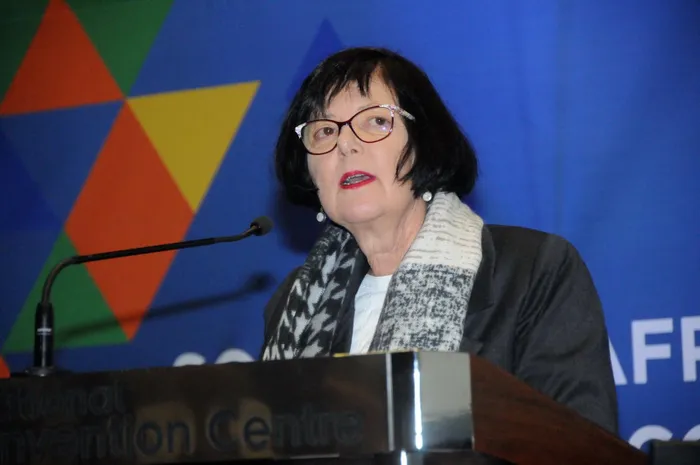The transport sector should chart a clearer map on our voyage to a low-carbon future
PCC

In her recent budget speech, Minister of Transport Barbara Creecy provides a breadth of fresh air towards revitalising South Africa’s not-so-healthy transport system, says the author.
Image: Supplied
In her recent budget speech, Minister of Transport Barbara Creecy provides a breadth of fresh air towards revitalising South Africa’s not-so-healthy transport system in becoming resilient and efficient, alive to the needs and operating environment of the current and future economy.
The Minister's policy speech illuminated a signal of South Africa’s intended transport trajectory and further announced the eminent revision of the Green Transport Strategy (GTS). That is a demonstration of a renewed political will towards the transformation of our transportation sector that is geared towards a just, sustainable, and low-carbon mobility - equitably serving people, the planet and the economy.
The budget speech’s reaffirmation of the Department of Transport’s (DOT) draft Just Transition Plan is a promising recognition of the socio-economic and justice complexities inherent in moving toward sustainable mobility.
It needs stating that the Presidential Climate Commission (PCC) supported the Department’ Just Transition Plan with technical oversight and modelling analysis to align mitigation goals with the country’s climate commitments. However, addressing critical gaps around implementation details, climate resilience, stakeholder inclusivity, and strategic zero-emission mobility adoption will decisively shape the sector’s transformative potential. To realise the plan’s ambitions, the finalisation and diligent implementation of the Transport Sector’s Just Transition Plan is essential.
The intensifying climate risks calls for urgency towards sustainable mobility. We cannot blink to the urgent transitional and physical climate change risks and the local implications for the transport sector which contributes 12.7% of national greenhouse gas (GHG) emissions, mainly because the sector is deeply integrated in major economic activities. To this end the Budget speech lost an opportunity explicitly articulate the importance of climate resilience, particularly given South Africa’s vulnerability to climate-induced events, which more often than not damages road, rail and telecommunications infrastructure – basically the backbone of our transport network and systems.
The budgetary allocation of R21.7 billion to enhance airport infrastructure, aimed at accommodating increased passenger numbers and air freight, highlights the interconnected nature of modern infrastructure investments. Such expansions inevitably trigger downstream effects on industries such as steel manufacturing, which carry significant carbon implications.
While commitments towards passenger and rail reform, road safety, and significant financial investments underscore the government's resolve, critical questions remain how these initiatives will concretely deliver an inclusive, integrated transport system aligned with low-carbon mobility and the Sustainable Development Goals (SDGs).
With South Africa's Climate Change Act now mandating carbon budgets for major emitters (such as steel) from 2026, synchronising transport infrastructure developments within these carbon limits will be critical to sustainable economic growth.
Aligning the revised strategy’s GHG emission targets closely with South Africa’s Nationally Determined Contributions (NDCs) and Just Transition Framework will demonstrate commitment, coherence, and credibility. Integration, Investment and Partnership is needed to drive transformation.
Primarily because transport remains a backbone of all economic activity and critical for our climate action ambitions, the Presidential Climate Commission (PCC) has previously highlighted, enhancing intergovernmental collaboration between key departments such as Transport; Forestry; Fishery and Environment (DFFE); National Treasury, and Trade, Industry, and Competition (DTIC) is pivotal to successfully transitioning towards low-carbon mobility.
Strategic spatial planning could significantly lower transport emissions and foster greater socio-economic inclusivity. Forward-thinking infrastructure planning that emphasises climate-proofing, inclusive spatial design, and proximity of transport hubs to residential communities will prove cost-effective in the long run and mitigate disruptions from future climate events.
By integrating green corridors and promoting pedestrian and cycling networks, South Africa can facilitate a modal shift towards public transport and location of public transport close to people to reduce their commuting costs and time, a much-required relief in this economy and this option has some significant Just Transition outcomes.
Clear delineation of public and private sector roles - especially regarding the ownership of strategic transport infrastructure like railways and ports - is essential. Minister Creecy’s reaffirmation that these assets will remain publicly owned offers a foundational principle for sustainable and equitable transport governance.
All and sundry of research and policy reform recommendations have overemphasised that collaboration between these state departments will enable investments at multiple fronts, from rail expansion, EV charging stations, electric buses, solar power inter-modal facilities, biogas taxis, to mention but a few easy wins which require effective partnerships with the private sector, given the state's fiscal constraints.
While this transition represents an economic opportunity, it needs to be done in a manner that makes moves us closer to our own national development ambitions driven by increased manufacturing with incentives and support for our local auto-manufacturing industry and emerging renewable energy sector amongst others.
Taking lessons from transformation in sectors like mining, energy and construction sector, the Minster is urged to not lower the gear on inclusivity but ensure procedural justice by engaging stakeholders and communities in policy formulation and implementation to optimise inclusive outcomes arising from a sustainable transport sector in our country.

Simphiwe Ngwenya, Senior Manager: Climate Mitigation at the Presidential Climate Commission.
Image: Supplied
Simphiwe Ngwenya, Senior Manager: Climate Mitigation at the Presidential Climate Commission.
*** The views expressed here do not necessarily represent those of Independent Media or IOL.
BUSINESS REPORT